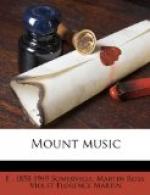Christian’s father, Richard Talbot-Lowry, was a good-looking, long-legged, long-moustached Major, who, conforming beautifully to type, was a soldier, sportsman, and loyalist, as had been his ancestors before him. He had fought in the Mutiny as a lad of nineteen, and had been wounded in the thigh in a cavalry charge in a subsequent fight on the Afghan Frontier. Dick, like Horatius, “halted upon one knee” for the rest of his life, but since the injury gave him no trouble in the saddle, and did not affect the sit of his trousers, he did not resent it, and possibly enjoyed its occasional exposition to an enquirer. When his father died, he left the Army, and, still true to the family traditions, proceeded to “settle down” at Mount Music, and to take into his own hands the management of the property.
Of the Talbot-Lowrys it may be truly said that the lot had fallen to them in a fair ground. Their ancestor, the Gentleman Adventurer of Queen Elizabeth’s time, had had the eye for the country that, in a slightly different sense, had descended to his present representative. Mount Music House stood about midway of a long valley, on a level plateau of the hill from which it took its name, Cnocan an Ceoil Sidhe, which means the Hill of Fairy Music, and may, approximately, be pronounced “Knockawn an K’yole Shee.” The hill melted downwards—no other word can express the velvet softness of those mild, grassy slopes—to the shore of the River Broadwater, a slow and lordly stream, that moved mightily down the wide valley, became merged for a space in Lough Kieraun, and thence flowed onwards, broad and brimming, bearded with rushes, passing like a king, cloaked in the splendours of the sunset, to its suicide in the far-away Atlantic. The demesne of Mount Music lay along its banks; in woods often, more often in pastures; with boggy places ringed with willows, lovely, in their seasons, with yellow flags, and meadowsweet, kingcups, ragwort and loosestrife. Its western boundary was the Ownashee, a mountain stream, a tributary of the great river, that came storming down from the hills, and, in times of flood, snatching, like a border-reiver, at sheep, and pigs, and fowl, tossing its spoils in a tumble of racing waves into the wide waters of its chieftain.
Mount Music House was large, intensely solid, practical, sensible, of that special type of old Irish country-house that is entirely remote from the character of the men that originated it, and can only be explained as the expiring cry of the English blood. How many Anglo-Irish great-great-grandfathers have not raised these monuments to their English forbears, and then, recognising their obligations to their Irish mothers’ ancestry, have filled them, gloriously, with horses and hounds, and butts of claret, and hungry poor relations unto the fourth and fifth generations? That they were a puissant breed, the history of the Empire, in which they have so staunchly borne their parts, can tell; their own point of view is fairly accurately summed up in Curran’s verse:—




